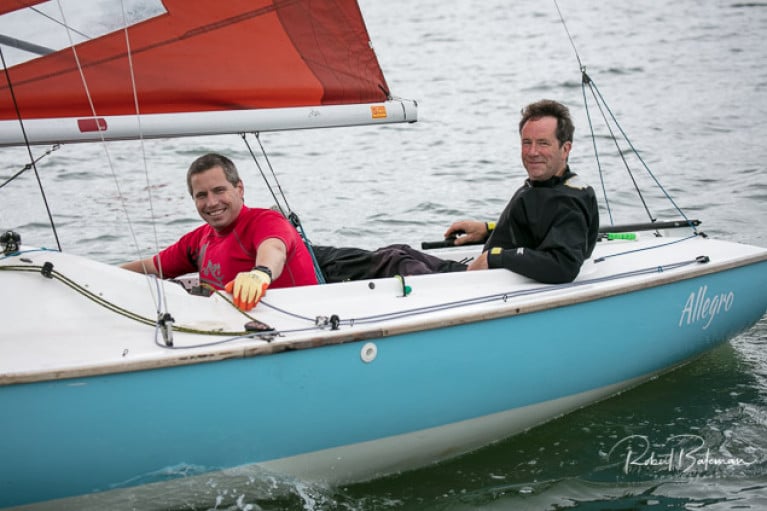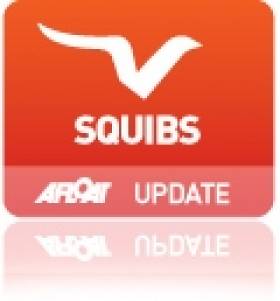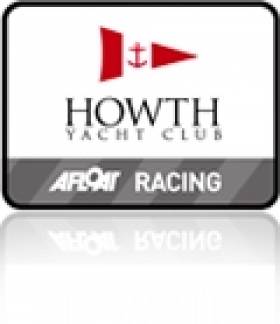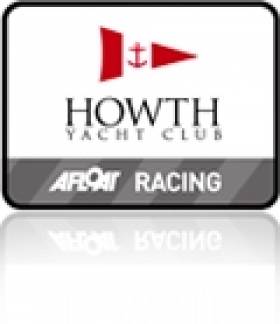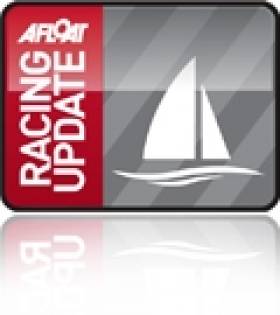Displaying items by tag: squibs
Colm Dunne and Rob Gill's Allegro from Kinsale Yacht Club leads the 2020 Squib Southern Championships after three races sailed in Cork Harbour yesterday.
Scroll down for Bob Bateman's photo gallery of Day one racing below.
The Cove Sailing Club hosted event is the first on design championships of the season and was sailed over windward-leeward courses on the Eastern Bank of the Harbour.
13 are competing including three Northern Ireland entries and a strong seven boat turnout from Kinsale.
Racing so far has been in light to medium westerly breezes.
Royal North of Ireland's Peter Wallace, on five points, trails Dunne by two points with Dunne's club-mate Ian Travers five points off the lead.
The Championship resumes this morning with a first gun at 10.55
Results are here
Royal St. George Pair Lead Irish Squib Championship (Photos Here!)
#squib – Vincent Delany and Fergal Gaynor sailing Femme Fatale are in charge after the first day's racing of the Irish National Squib championships on Dublin Bay. Scroll down for photos from Gareth Craig below. The Royal St. George YC paring have established a lead of six points after thre the first three races. Kinsale visitors Marcus and Megan Hutchinson are second on 15 points. Third is another local pairing Aidan O'Connell and Ben O'Donoghue Provisional Day one results subject to protest are posted below as a pdf for download.
Squib Nationals at Howth over Bank Holiday Weekeend
Howth Yacht Club hosts the SIAC Construction Squib National Championships over the Bank Holiday Weekend, with the biggest fleet in a decade – 36 and growing - contesting the 7-race series.
The 2010 National Champions, Gordon Patterson and Ross Nolan from the Royal North of Ireland YC, will be defending their title, with competition coming from clubmates Peter Wallace and Kerry Bloomer (winners of the Squib Traveller’s Trophy already), and also Aiden O’Connell and Sian McCleave of the Royal St.George YC.
The local Howth challenge will be headed by Emmet Dalton and Sé O’Leary in ‘Klipbok’ (who have narrowly missed out on a podium finish on several occasions) and Jonathan and Hazel Craig in ‘Kerfuffle’, who performed well in the recent UK Champs in Plymouth.
Howth Yacht Club expands Spring Warmer Series
Over 40 boats took part in the 2010 series and with the SB3 Easterns taking place in Howth at the end of April and the Cruiser Classes getting racing practice ahead of their ICRA Championships, the standard of competition should be even higher this year.
Taking place over the first three Saturdays in April, the 2011 series will have two race areas for the eight classes. The racing format will be the same as last year with two windward/leeward races scheduled for each of the 3 Saturdays finishing with a prize-giving after the final races on April 16th.
First guns will sound at 10.55 on April 2nd and entries can be made online on www.hyc.ie.
70 Squibs Head for Dun Laoghaire
More than 70 Squibs will converge on Dun Laoghaire this weekend for the start of its SF Marinas sponsored UK national championships.
The championships, which are held in Ireland every five years, will see some of the top competitors in this class including Dick Batt, a sailmaker and chief measurer for the Beijing and London Olympics and Irishman Owen Delaney, former Irish Helmsman Champion of Champions.
There is also keen interest from a wide range of clubs including the Royal North of Ireland Yacht Club and Kinsale Yacht Club at the other end of the Island.
Squibs are two-man keelboats measuring seven metres long. They are favoured both as an exciting racing boat, because of their strength and safe design, and as a teaching boat. The Squib Class fleet is one of the largest one-design fleets in Britain and Ireland, with over 810 boats.
The Royal St George Yacht Club says it is delighted to have been selected by the Squib Class to host the 2010 Championship which is a great opportunity to show what Dublin Bay can offer, including its beauty, the varied sailing waters, and the vagaries of the tides.
“We believe Dun Laoghaire, both on and off the water, is a wonderful venue to make Squibs 2010 a memorable event.”
The sponsors of this year’s championship are marine services company, SF MARINA IRELAND, which last month installed new, all concrete, breakwater pontoons at the Royal Saint George Yacht Club, a great addition to the clubs facilities.
SF MARINA IRELAND builds marinas and installs floating pontoons and breakwaters all over the island of Ireland as well as the UK. The directors are Rod and Julie Calder-Potts who trade under the name, Milford Marina Systems, based in Cuffesgrange, Co Kilkenny.
Recently, the company designed and fitted concrete pontoons weighing 1,000 tonnes on the River Liffey to service the Waterbuses Spirit of Docklands and Liffey Voyage. The project consisted of a mega yacht visitors berthing facility on the Custom House Quay and three waterbus landing stages - one at The Point, one south-east of The Ha’Penny Bridge and one at the mouth of George’s Dock on Custom House Quay.
SF MARINA IRELAND is the sole Irish agent for Swedish company SF MARINA specializing in the supply and installation of floating concrete breakwaters that can stand up to the rigorous maritime conditions.
Rod Calder Potts said the company is very proud to be associated with the historic Royal Saint George Yacht Club and with the Squibs National Championships.
He said the installation of the new pontoons last month was the company’s third major installation in Dun Laoghaire Harbour and the eighth in the Dublin Bay area. “We enjoy the challenge of dealing with the difficult Irish tides, winds and waves. It is a pleasure and a privilege dealing with the wonderful sailing clubs around Dublin Bay.” he said.


























